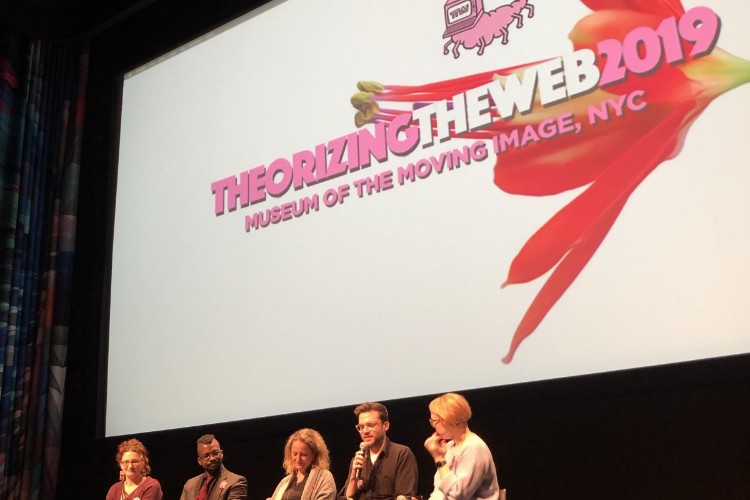Theorizing the Web 2019

Share
Theorizing the Web has brought people together in critical discussion of technology and the web and their role in society since 2011. To quote their about blurb:
“Theorizing the Web is an inter- and non-disciplinary annual conference that brings together scholars, journalists, artists, activists, and technology practitioners to think conceptually and critically about the interrelationships between the Web and society. We deeply value public engagement, and consider insights from academics, non-academics, and non-‘tech theorists’ alike to be equally valuable.”

I had the privilege of attending two days of #TtW19 at the Museum of the Moving Image in Astoria, Queens. The programming filled two days with three simultaneous sessions and much rich discussion. Each session consisted of multiple presentations organized around a theme, followed by a full panel discussion and audience QA.
Topics were wide ranging, from the personality of robots, to what happens to society when even our dating lives are governed by corporately-owned and calibrated algorithms, to questions of labor, identity and representation.
I attended the following sessions (descriptions are from the program, followed by my observations):
Good Hustle
Movements and protests can no longer choose to be online or not. The question now is how to best use online affordances while avoiding common pitfalls.
This one was particularly interesting to me, having worked on the Occupy directory. The line between harvesting data, thus aiding the work of law enforcement and providing valuable movement intel, is a real concern. Perhaps it all comes down to Audre Lorde’s “The master’s tools will never dismantle the master’s house” quote. But surely we need to benefit from technological advancement in our organizing or we’re working with our hands tied behind our backs. Certain prophylactic measures, and anonymization of data, allows us to organize securely.
Death Valley
As the tech industry proceeds with its boundless aspirations to disrupt and data-fy more aspects of everyday life, what does that mean for the rest of us and what can we do to stop it?
Rachel Bergmann #farmtobrowser starts things off by discussing how Firefox and others are concepts from the healthcare/mindfulness/wholefoods movements - diets detox when talking about personal choices in our data practices and how—though it softens the current fear-based conversation—replaces it with feelings of insecurity and shame.
Fuzzy ethics: How Google has gone “beyond good and evil” and how their employees are on the front lines in holding them to ethical practices — such as the Google walkouts over ending binding arbitration in sexual harassment cases.
Go Code Girl: without a doubt code is a language that can empower people in our current society. Without throwing out the baby with the bathwater, Allie Watson surveys the “learn to code” movement and the rhetoric surrounding it. Much of the language surrounding this movement focuses on the empowerment of women and marginalized communities, meanwhile ignoring systemic oppression and focusing on the neoliberal agenda of “pulling oneself up by one’s bootstraps” and conflating empowerment with labor for Big Tech over liberation.
Smooth Fantasies: frictionless experiences can save you from the drudgery of everyday life. Too busy to do your own shopping—try Instacart. Want someone to clean your house, but find negotiating rates with a human to be difficult/off putting? Maid.app has got your back. But this new focus on frictionlessness simply offsets capitalism's “sacrificial zones” … such zones describe the pollution in a Chilean mining-town, living conditions in Chinese factory towns, predominantly non-white bodies in “far away places”… but now they are hitting closer to home, and expanding, for your convenience.
Fakes and Pains
From post-truth to deep-fakes, people are decrying a reality torn apart and increasingly difficult to comprehend. Is it all the fault of the internet, or is our epistemic chaos not really so novel?
Couched in a lot of pauses to describe how truly—deeply— problematic these practices are—the panelist goes on how to describe how this practice is ultimately a logical outcome of the fan fiction community and deep-fake technology
By the Numbers
Our health has been made into intimate and minute data points, now fodder for big business. This panel explores how health data is collected and monetized, and what this means for us all.
So your pacemaker is connected to the internet? Who owns the data? What do they do with it, can you see it? Monitoring devices are now in our most intimate places… what then?

Theorizing the Web was stimulating, and exhausting. Luckily some friends from Pittsburgh and Detroit were visiting town and planning to see the excellent Jim Henson exhibition at the very same museum, and we bounced out for a wonderful Brazilian evening snack (I’m Brazilian, as is half of Astoria) at a local eatery named Beija Flor.
I came away with more questions than answers, overall there was a dystopic tension in the air, even if it was met with humor and panache. Still in an era rife with techno-cheerleading, it’s quite refreshing to spend a weekend engaging critically with technology and its role in shaping the world around us. The conference is in its ninth year, and I’m happy to finally attend - it will be interesting to return next year and see what new concerns arise, and how the discourse / practice around these issues evolve.
Session videos can be found on their website. Note: navigating between sessions is done within the video player.
You can also find a treasure trove of videos from past years on their YouTube channel.

